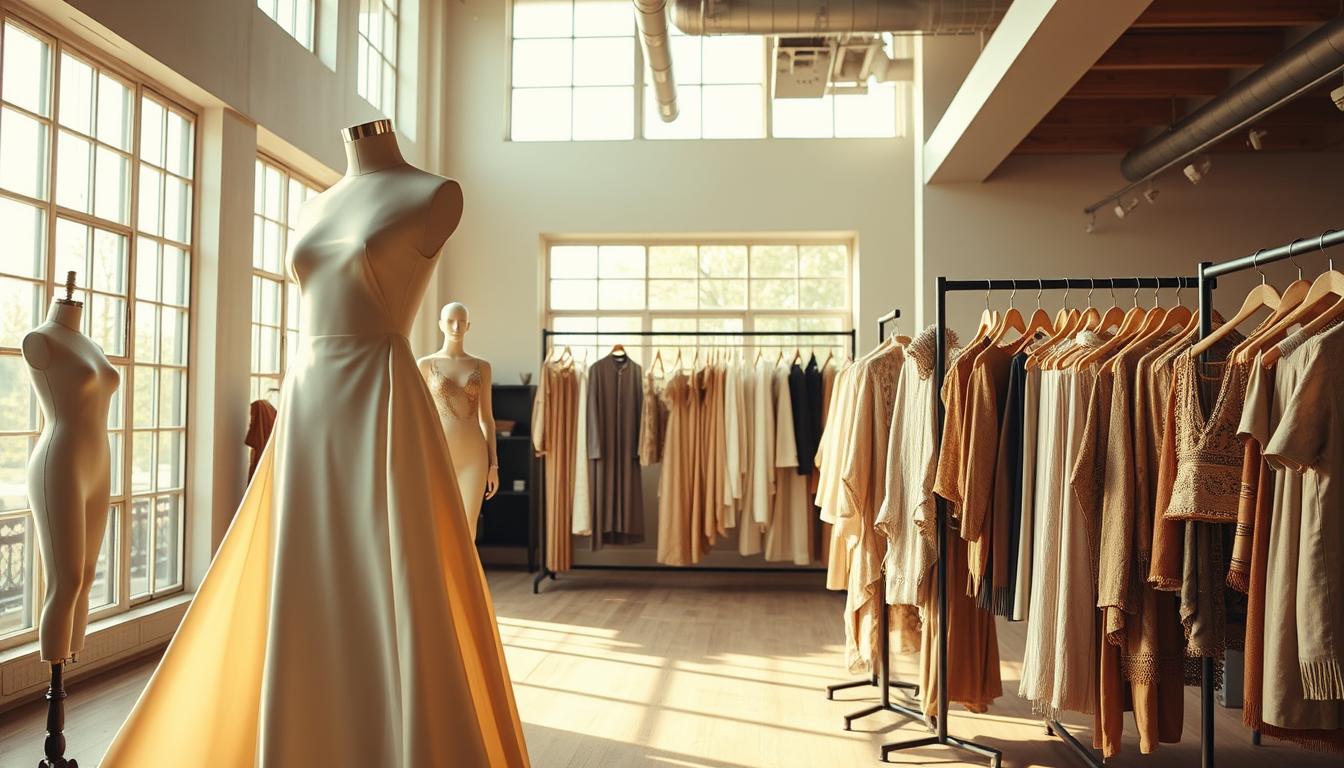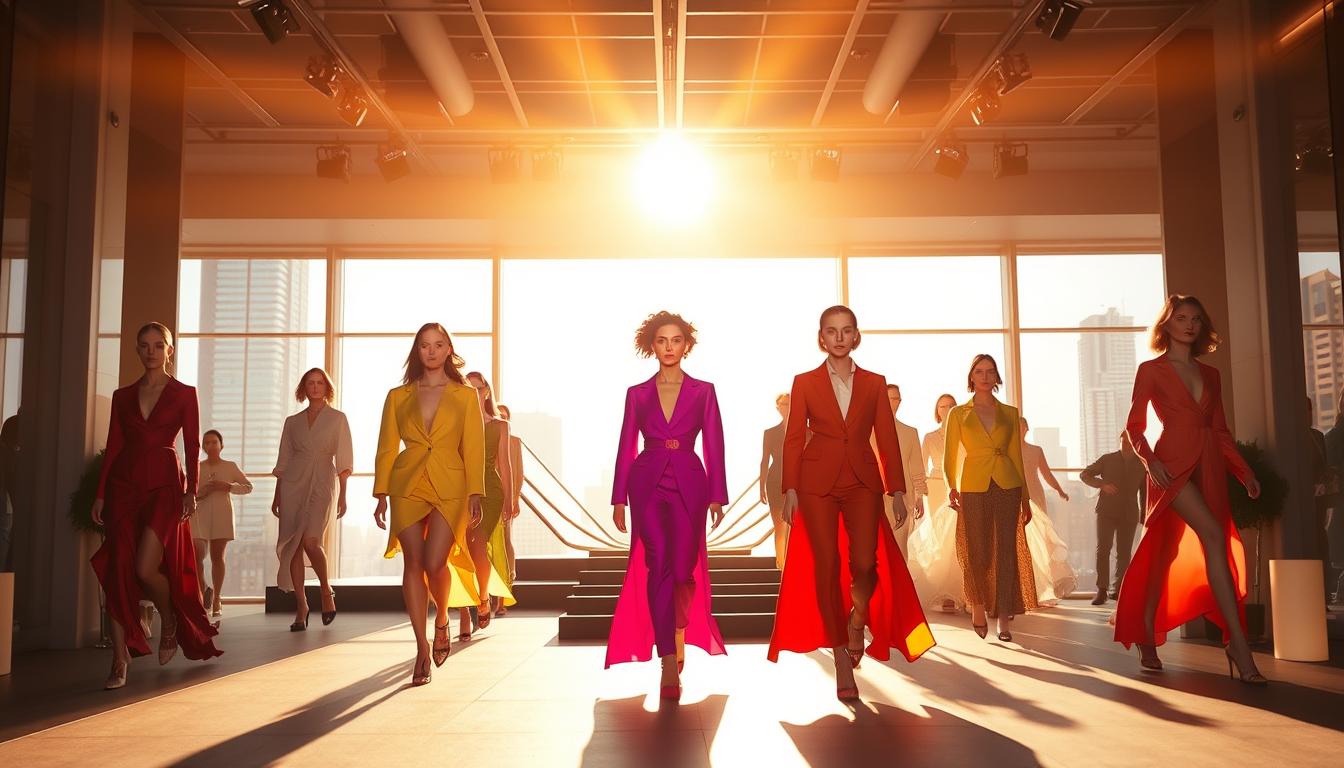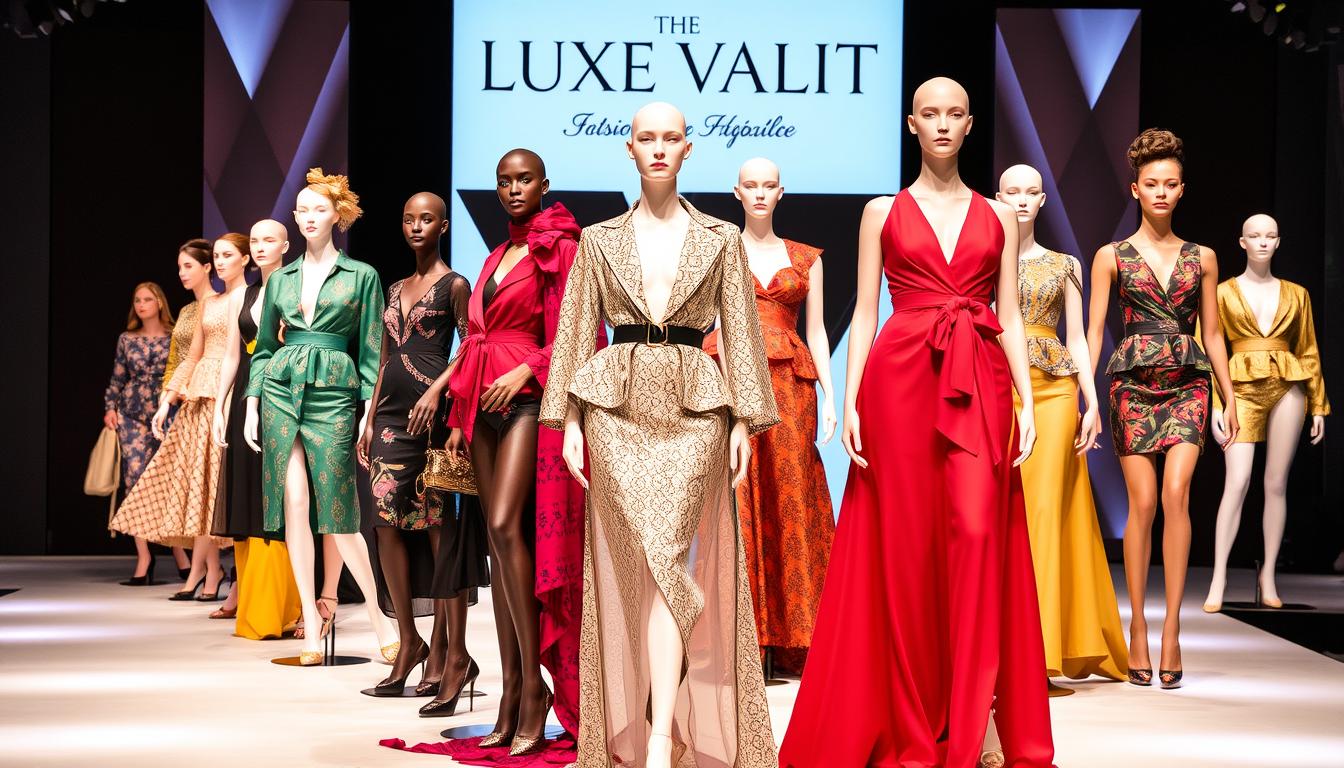The luxury fashion industry is at a crossroads, driven by a growing awareness of its environmental and social impacts. As consumers increasingly demand more responsible practices, luxury brands are redefining what it means to be both fashionable and sustainable.
This transformation is not just about adopting sustainable practices; it’s about reimagining the very essence of luxury. It’s about creating a new paradigm where exclusivity, craftsmanship, and environmental consciousness coexist. As highlighted in a recent article on sustainable fashion, the shift towards sustainability is becoming a core value in the luxury sector.
We’re witnessing a profound change in how fashion is designed, produced, and consumed. The future of luxury depends on its ability to balance opulence with sustainability.
Key Takeaways
- Luxury brands are embracing sustainability as a core value.
- The concept of luxury is being redefined to include environmental responsibility.
- Consumer expectations are driving the demand for sustainable luxury.
- Innovative materials and circular business models are key areas of focus.
- Sustainability is crucial for preserving the essence of luxury.
The Evolution of Sustainable Luxury
Sustainability is redefining the luxury fashion landscape, shifting from exclusivity to responsibility. As consumers become more environmentally conscious, the definition of luxury is expanding beyond craftsmanship and rarity to include ethical sourcing and sustainable production.
From Exclusivity to Responsibility
Historically, luxury was synonymous with exclusivity and opulence. However, as the global conversation shifts towards environmental responsibility, the most prestigious fashion houses are now proving that luxury and sustainability can coexist. Pioneering brands have begun incorporating sustainable practices, setting new standards for the industry. According to a study on sustainable luxury, the industry is moving towards a more responsible model sustainable luxury practices.
Why Sustainability Matters in High-End Fashion
Sustainability has become crucial for high-end fashion due to consumer demand, resource scarcity, and the industry’s significant environmental footprint. By adopting sustainable practices, luxury fashion brands enhance the core values of luxury—quality, longevity, and thoughtful creation. Moreover, sustainability is becoming a new form of exclusivity, with brands competing to demonstrate their environmental credentials and commitment to responsibility.
As the luxury fashion industry continues to evolve, it is clear that sustainable luxury is not just a trend but a fundamental shift in how fashion is perceived and consumed. By prioritizing sustainability, luxury brands can drive innovation, enhance brand loyalty, and ensure long-term profitability.
The Future of Sustainable Fashion in the Luxury Industry
As we look to the future, it’s clear that sustainable fashion will play a pivotal role in shaping the luxury industry. The growing awareness among consumers, especially millennials and Gen Z, is driving this change. According to a report from UBS Investment Insights, millennials are set to make up 45% of luxury goods purchases by 2025, while Gen Z will account for 40% of the same market by 2035.
Current Trends Reshaping Luxury
The luxury industry is witnessing a significant shift towards sustainability, driven by changing consumer demographics and preferences. Emerging technologies and innovations are poised to revolutionize sustainable luxury, from lab-grown materials to blockchain-tracked supply chains. Luxury brands are now incorporating sustainability into their core business strategies rather than treating it as a separate initiative.
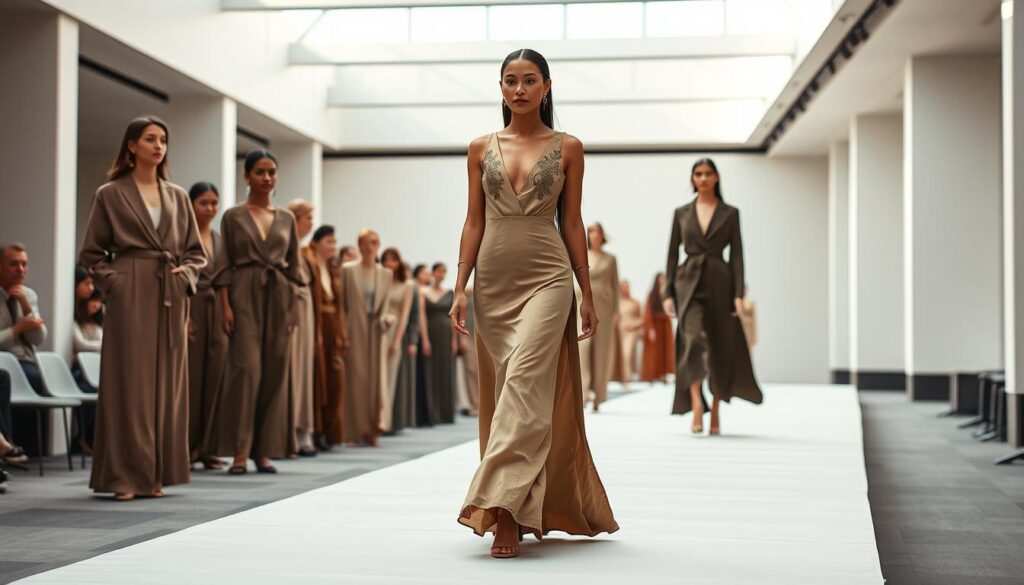
| Trend | Description | Potential Impact |
|---|---|---|
| Lab-Grown Materials | Materials produced using biotechnology | Reduced environmental footprint |
| Blockchain-Tracked Supply Chains | Transparent tracking of products throughout the supply chain | Increased transparency and accountability |
| Circular Business Models | Business models that promote the reuse and recycling of products | Reduced waste and increased sustainability |
Consumer Demand Driving Change
Consumer education and awareness are creating more sophisticated luxury buyers who demand transparency and sustainability credentials. Social media and digital platforms are amplifying consumer voices and accelerating the push for sustainable practices in luxury fashion.
Luxury brands are responding to consumer activism by adopting more collaborative approaches to sustainability. A joint State of Fashion 2021 report found that nine out of 10 Gen Z consumers believe brands should detail their stances on environmental and social issues.
Innovative Materials and Production Methods
As we look to the future, it’s clear that sustainable luxury fashion is being driven by groundbreaking materials and manufacturing processes. At the heart of this transformation is a commitment to using eco-friendly materials. Luxury brands, once known for their reliance on traditional, resource-intensive fabrics, are now embracing innovative, sustainable alternatives.
Eco-Friendly Fabrics Revolutionizing Luxury
Organic cotton, recycled polyester, and biodegradable materials like Tencel and hemp are making their way into high-end collections. Leading the charge is Stella McCartney, a pioneer in sustainable fashion, who has long advocated for the use of ethically sourced materials without compromising on quality or style. Stella McCartney’s commitment to sustainability is evident in her designs that incorporate eco-friendly fabrics.
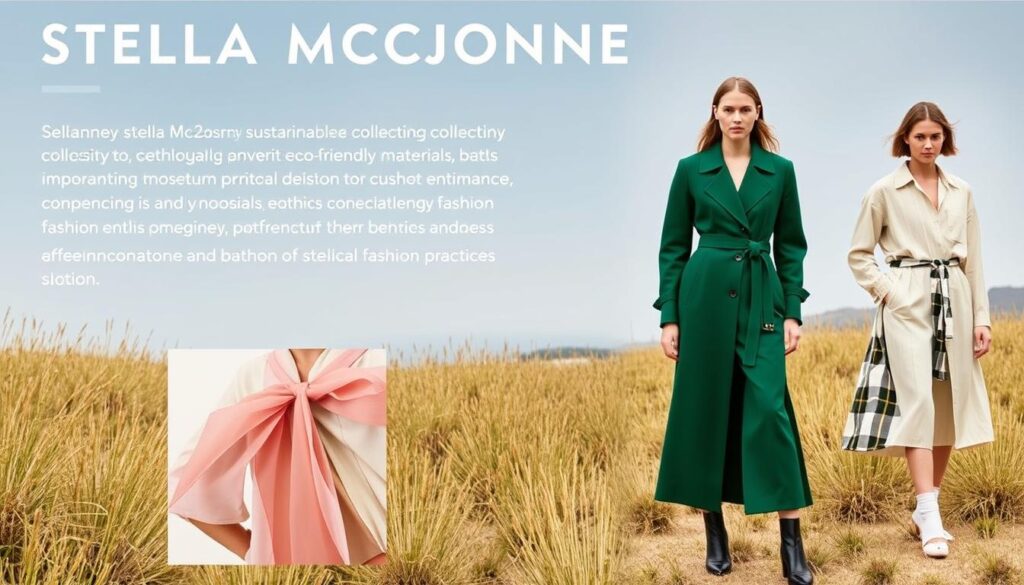
Ethical Sourcing and Fair Labor Practices
Luxury brands are not only focusing on eco-friendly materials but also on ethical sourcing practices. Ensuring fair wages, safe working conditions, and community support throughout their supply chains is becoming a cornerstone of luxury production. Brands are implementing transparent supply chain monitoring to maintain ethical standards from raw material to finished product.
Reducing Environmental Footprint in Production
Innovative production methods are being adopted to minimize waste, reduce water usage, and lower carbon emissions while maintaining the craftsmanship luxury brands are known for. For instance, Hermès has developed Sylvania, a mushroom-based leather alternative, showcasing the industry’s potential for innovation. This shift towards sustainable production is not only beneficial for the environment but also enhances the luxury brand’s reputation.
By embracing these changes, luxury fashion brands are not only reducing their environmental impact but also setting new standards for sustainability in the industry. The future of luxury fashion is being shaped by these innovative materials and production methods, ensuring a more sustainable and responsible industry.
Pioneering Brands Leading the Sustainable Luxury Movement
Luxury fashion’s embrace of sustainability is being driven by innovative brands that are redefining the industry. The shift towards eco-friendly practices is not just a trend; it’s a fundamental change in how luxury fashion operates.
Established Luxury Houses Embracing Change
Heritage luxury houses are successfully pivoting towards sustainability while maintaining their brand identity. For instance, Gabriela Hearst’s eponymous brand has made sustainability its cornerstone, using deadstock fabrics and minimizing waste in production. Similarly, Chanel has committed to a more sustainable future with its Mission 1.5°C initiative, aligning with the Paris Agreement to limit global warming.
Other luxury conglomerates like LVMH and Kering are implementing group-wide sustainability initiatives that transform entire portfolios of brands. Specific sustainability innovations from traditional luxury houses include Hermès’ mushroom leather and Gucci’s carbon-neutral supply chain.
Emerging Sustainable Luxury Labels
Emerging luxury brands have built their identities around sustainability from inception, creating new models for the industry. These newer sustainable luxury labels are challenging conventions and redefining what luxury means for contemporary consumers.
Both established and emerging brands are collaborating on industry-wide sustainability initiatives, sharing best practices and technologies. This collaboration is driving the entire luxury fashion sector forward, creating a positive cycle of improvement and accountability.
As the fashion industry continues to evolve, it’s clear that sustainable luxury is becoming the new standard. The pioneering brands leading this movement are not only reducing their environmental footprint but also elevating the concept of luxury itself.
Circular Fashion: The New Business Model
Circular fashion is revolutionizing the luxury sector by promoting the reuse, recycling, and repurposing of high-end products. This approach is centered on prolonging the life cycle of luxury items, challenging the traditional notions of fast fashion. As a result, luxury brands are creating systems where products are designed to be reused, repaired, and recycled rather than discarded.
Rental and Resale Markets

The rise of luxury resale platforms like Vestiaire Collective and The RealReal is evidence of a growing demand for pre-owned luxury goods. These platforms are legitimizing pre-owned luxury and extending product lifecycles. Luxury rental services are also creating new access points to high-end fashion while reducing the environmental impact of occasional-wear items.
Upcycling and Product Lifecycle Management
Brands like Balenciaga and Prada are tapping into the trend by launching their own upcycling initiatives. These initiatives offer customers the opportunity to bring in older pieces for repair or transformation into new, unique items. Product lifecycle management is being incorporated into luxury design processes, with brands considering repair, resale, and recycling from the initial concept stage.
Transparency and Traceability in Supply Chains
Blockchain and digital tracking technologies are enabling unprecedented transparency in luxury supply chains. This allows consumers to verify the ethical and environmental credentials of their purchases. Traceability is becoming a luxury value proposition in itself, with brands competing to provide the most comprehensive information about their products’ origins and impact.
Conclusion: Redefining Luxury for a Sustainable Future
In the evolving world of luxury fashion, sustainability is emerging as a key driver of change. As the world grapples with environmental challenges, the fashion industry has a critical role to play in shaping a sustainable future. Luxury brands, with their influence and reach, are uniquely positioned to lead this charge.
By embracing sustainability, luxury brands are not only preserving the planet but also ensuring that the concept of luxury remains relevant for generations to come. The most desirable luxury items will be those that tell a story of craftsmanship, responsibility, and respect for the world we live in.
As consumers drive this transformation with their purchasing decisions, sustainable luxury fashion will continue to evolve. We must embrace this new vision of luxury that honors both timeless craftsmanship and our planet’s future. CoWrit Technologies Inc supports brands in their sustainability communication through content writing, digital marketing, and other services, helping them navigate this new era.
